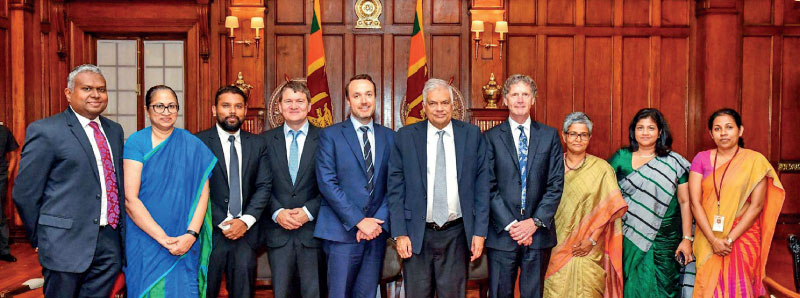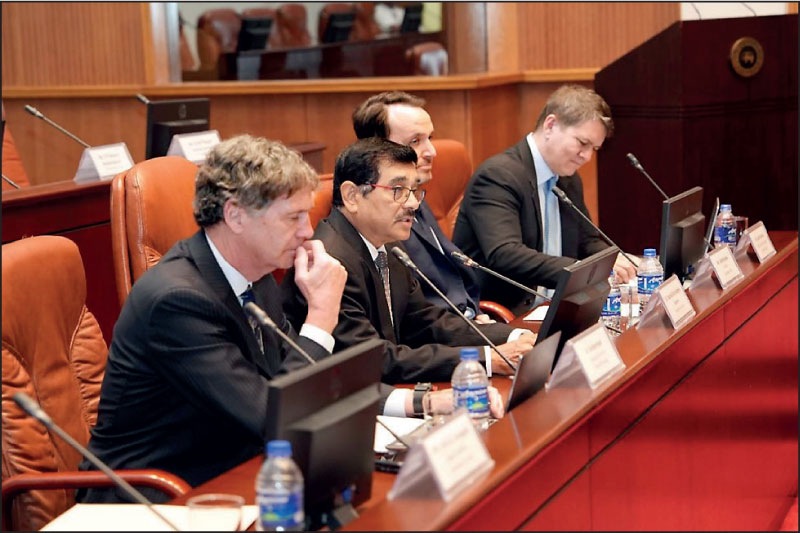Thursday Feb 19, 2026
Thursday Feb 19, 2026
Monday, 18 September 2023 02:28 - - {{hitsCtrl.values.hits}}

From left: FIU Additional Director Dr. Ayesh Ariyasinghe, CBSL Deputy Governor Nelumani Daulagala, FIU Senior Assistant Director Dilan Siriwardana, APG Director Mutual Evaluations David Shannon, APG Co-Chair, Canada Department of Finance in Ottawa Financial Sector Policy Branch Associate Assistant Deputy Minister Julien Brazeau, President Ranil Wickremesinghe, APG Executive Secretary Dr. Gordon Hook, FIU Director Enoka Mohotty, FIU Additional Director Dr. Subhani Keerthiratne, and FIU Deputy Director Wangeesha Karunarathne

From left: APG Executive Secretary Dr. Gordon Hook, Central Bank Governor and AML/CFT National Coordinating Committee Chairman Dr. Nandalal Weerasinghe, APG Co-Chair and Canada Department of Finance in Ottawa Financial Sector Policy Branch Associate Assistant Deputy Minister Julien Brazeau, and APG Mutual Evaluations Quality and Consistency Director David Shannon
In response to an invitation from the Financial Intelligence Unit of Sri Lanka, a high-level delegation from the Asia Pacific Group on Money Laundering (APG) visited Sri Lanka to engage with local authorities and provide them with crucial insights regarding the upcoming mutual evaluation of Sri Lanka’s Anti-Money Laundering and Countering the Financing of Terrorism (AML/CFT) Framework.
The international delegation included: APG Co-Chair and Canada Department of Finance in Ottawa Financial Sector Policy Branch Associate Assistant Deputy Minister Julien Brazeau, APG Executive Secretary Dr. Gordon Hook, and APG Mutual Evaluations Quality and Consistency Director David Shannon.
The APG is one of the main regional monitoring bodies of the Financial Action Task Force (FATF), committed to monitoring and guiding the member jurisdictions in effective implementation of the international standards to combat money laundering (ML), terrorism financing (TF), and proliferation financing associated with weapons of mass destruction (PFWMD). Approximately 200 countries are affiliated with the nine regional bodies under the FATF’s purview. Sri Lanka is one of the 13 founding members of the APG, since 1997.
The FATF serves as the global watchdog against ML/TF, setting internationally recognised standards aimed at preventing these illicit activities and the harm they inflict on society. Member countries are expected to adhere to these standards, and the FATF assesses their performance based on a comprehensive assessment methodology that encompasses two key dimensions:
1. Technical compliance: Evaluates the legal and institutional framework, as well as the authority and procedures of competent authorities.
2. Effectiveness assessment: Gauges the extent to which the legal and institutional framework produces the anticipated results.
Sri Lanka was identified as a “Grey List” country with strategic deficiencies in its AML/CFT Framework twice by the FATF in 2011 and 2017, respectively, subsequent to Sri Lanka’s 1st and 2nd Mutual Evaluations. During the 2017 Grey Listing, the European Union also “Black Listed” Sri Lanka for non-compliance with these international standards. In 2019, Sri Lanka was able to exit the Grey List after addressing the gaps in the legal and institutional framework.
Sri Lanka’s 3rd Mutual Evaluation is scheduled in 76 weeks (March 2025). As a nation, it is imperative that Sri Lanka achieves Technical Compliance with the FATF 40 Recommendations and ensure that our AML/CFT framework delivers expected results, as measured by the FATF’s 11 Immediate Outcomes. To this end, there are 24 stakeholders actively engaged in combating ML/TF in the country. The Financial Intelligence Unit, as the focal point in coordinating efforts, has obtained the approval of the Cabinet of Ministers for the stakeholder-wise Actions Plans aimed at addressing the identified gaps in the AML/CFT Framework.
During the three-day visit, the delegation had the privilege of meeting with key figures in Sri Lanka, including the President, the Chief Justice and Senior Justices of the Supreme Court, the Foreign Minister, the Attorney General, and the Governor of the Central Bank/Chairman National Coordinating Committee on AML/CFT, senior law enforcement officials alongside private sector and other key stakeholders.
The delegation observed that at the highest levels of Sri Lanka’s leadership, there is a deep understanding of the significance of the upcoming Mutual Evaluation, and that it is imperative that all the stakeholders are committed to achieving strong results that mirror a resilient AML/CFT system. Implementing FATF standards for enhanced effectiveness is fundamental to safeguarding our economy and society from profit-driven crimes, terrorism, and the proliferation of weapons of mass destruction.
Sri Lanka is acutely aware of the severe costs incurred by the country due to terrorism, terrorist financing, drug trafficking, corruption, trade-related crimes, and other profit-driven criminal activities, including money laundering. To successfully prepare for the mutual evaluation and avoid the adverse economic consequences of FATF grey-listing, it is paramount to prioritise activities in the following order:
1. Focus on effectiveness: Emphasise the ability of the AML/CFT system to produce operational results that address Sri Lanka’s specific risks effectively.
2. Enhanced monitoring: Stakeholders should intensify monitoring of progress and operational outcomes to support the advancement of priority implementation plans and surmount any obstacles to effectiveness.
3. Timely legislation: Expedite the passage of critical AML/CFT-related legislation to ensure the availability of the necessary tools for achieving operational outputs.
4. Resource allocation: Allocate adequate resources on a priority basis to agencies responsible for implementing the AML/CFT framework to facilitate the achievement of operational outcomes timely.
5. Inter-agency coordination: Sustain inter-agency coordination through effective leadership and well-supported mechanisms for targeted planning and progress monitoring in line with implementation plans.
6. Prosecution: Enhancing the capacity and active involvement of prosecutors in money laundering and terrorism financing cases.
7. Law enforcement: Bolster implementation by law enforcement agencies, particularly through the clearance of backlogs in money laundering cases and increase in the scope of asset recovery and money laundering-related activities.
8. Judiciary: Improve the capacity of the Judiciary for timely and effective adjudication of money laundering cases and terrorism financing cases
9. Private sector engagement: Encourage active involvement of the private sector, fostering shared goals with the government for priority implementation of AML/CFT systems.
10. International cooperation: Strengthen and focus on international cooperation, recognising its pivotal role in demonstrating effectiveness. Foster deeper collaboration with countries that share key money laundering and terrorist financing risks.
By diligently adhering to these prioritised actions, Sri Lanka can secure a favourable outcome in its Mutual Evaluation and avoid the adverse economic and financial consequences associated with FATF Grey-Listing. Therefore, each of the 24 stakeholders are expected to ensure they have made every possible effort within their capacity to address the gaps in the AML/CFT Framework in a timely manner to face the country’s 3rd Mutual Evaluation.